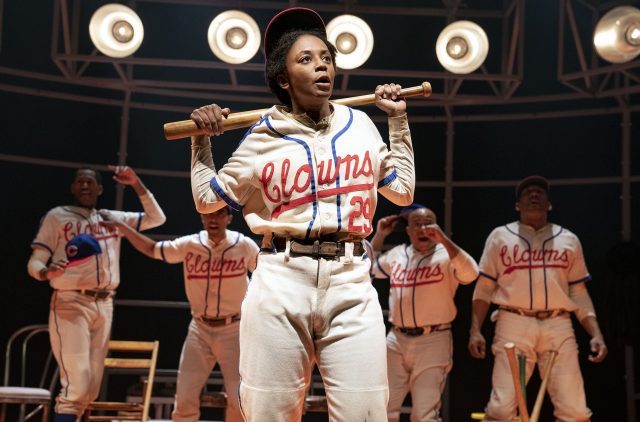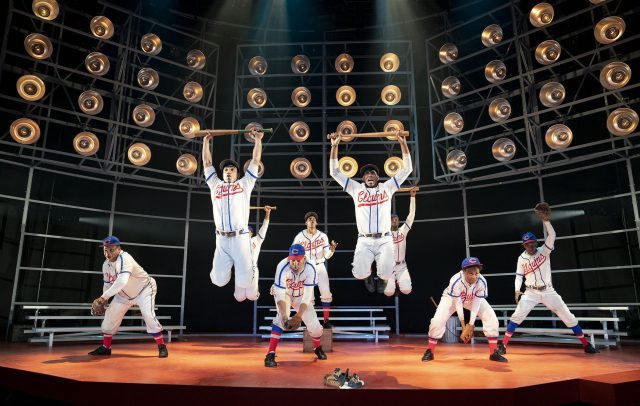
April Matthis scores as Negro Leagues player Toni Stone in Lydia Diamond play at the Laura Pels (photo by Joan Marcus 2019)
Laura Pels Theatre
Harold and Miriam Steinberg Center for Theatre
111 West 46th St. between Sixth & Seventh Aves.
Tuesday – Sunday through August 11, $79-99
212-719-1300
www.roundabouttheatre.org
April Matthis steps up to the plate and delivers big-time as the title character in Lydia Diamond’s Toni Stone, which opened tonight at the Roundabout’s Laura Pels Theatre. Mathis is utterly engaging as Toni Stone, the first woman to play in the otherwise all-male Negro Leagues. Born Marcenia Lyle Stone in West Virginia in 1921, Stone was a tomboy growing up, with a special affection — and talent — for baseball. “This is what I need. What I’m good at. What I do better than anybody. What I know better than anybody,” she tells the audience at the start of the play. She also explains, “I’m not a big talker. I talk a lot, but I don’t talk big. I have pride, but I wouldn’t say I’m proud. I don’t put more in a story than is really there. And I don’t like it when other people do. So don’t think I’m bragging when I tell you that I do the things I do well, better’n anybody.” That admission is what makes the play work so well, a guideline that Diamond and Tony-winning director Pam MacKinnon follow like a rulebook; the show is not an overwrought melodrama about a woman succeeding where only men had before, or a cliched tale of a superstar lady attempting to balance sports with her home life, or a worshipful celebration of a heroic athlete fighting the status quo and leading her team to a championship. It’s just about Toni Stone, a relatively ordinary woman who was so good at playing baseball that she decided that’s all she wanted to do, just play the game without any of the meta that comes with being black and a woman during the Jim Crow era.

Indianapolis Clowns players clown around in Roundabout production of Toni Stone (photo by Joan Marcus 2019)
Riccardo Hernandez’s set resembles parts of a ball field, with stadium lighting, three rows of rafters, and dugout benches. Most of the cast, primarily consisting of Stone’s teammates, are always in their uniforms, hanging out in the background like a Greek chorus, taking practice swings, and razzing each other, occasionally joining Stone in the spotlight. (The period costumes are by Dede Ayite, with lighting design by Allen Lee Hughes and choreography by Camille A. Brown.) Stone broke into the Negro Leagues in 1953 with the Indianapolis Clowns, represented here by catcher Willie “Stretch” Gaines (Eric Berryman), chief clown Richard “King Tut” King (Phillip James Brannon), the short, brainy, well-hung Spec Bebop (Daniel J. Bryant), ladies’ man Elzie Marshall (Jonathan Burke), the flashy but not-too bright Jimmy Wilkes (Toney Goins), Woody Bush (Ezra Knight), utility man Rufus McNeal, and the hard-drinking Willie Brown. (King Tut and Spec were real players while the others are fictional composites.) Diamond (Stick Fly, Smart People), who admittedly does not know much about sports, was approached to write the play by independent producer Samantha Barrie and baseball fanatic Mackinnon (Clybourne Park, Who’s Afraid of Virginia Woolf?), who had optioned the 2010 book Curveball: The Remarkable Story of Toni Stone by Martha Ackmann.
Their collaboration results in a well-balanced narrative that avoids banal genre tropes even as the story deals with racism, misogyny, homophobia, and exploitation. Stone, who replaced Hank Aaron on the team, refuses to be turned into a novelty; when she is first signed by Clowns owner Sydney Pollack — “He’s white. He’s the owner of the Clowns,” she says, even though he’s played by a black man — he tells her that he is going to have the pitchers from the other clubs take it easy on her, which enrages her. She just wants to be treated like any other player, a second baseman doing her job. She works so hard at baseball that she doesn’t have the time, or desire, for much of a social life, although she is aggressively courted by politically connected entrepreneur Auralious Alberga (Harvy Blanks). And she confides in an elegant prostitute named Millie (Kenn E. Head), a character inspired by the many madams Stone got to know while barnstorming through the South who would let her stay in the brothels when segregated hotels shut their doors on the Clowns.
Matthis (Measure for Measure, Signature Plays: Funnyhouse of a Negro) hits a home run as Stone, giving a gem of a performance, instantly developing an easygoing, casual rapport with the audience. Just as Stone was the only woman on the Clowns, Matthis is the only woman in the cast, as men take on the other female roles. Mackinnon gets the sports right, which is not always the case in theater, which can sacrifice crucial little details in favor of artistic license. In addition, you don’t need to know anything about sports to get sucked into the innate charm of Toni Stone, which at its core is about the erasing — one could say whitewashing — of women, especially black women, from history. Prior to Ackmann’s book and Diamond’s play, Stone was barely a footnote in the history of baseball and the Negro Leagues, but her legacy is now sealed, without being glorified, which is key, especially because, as it turns out, she was a solid if unspectacular player, albeit a groundbreaker. Toni Stone continues at the Laura Pels through August 11; starting June 21, the Roundabout will have ballpark-style giveaway nights for the first twenty-five ticket holders to check in at the merch booth.